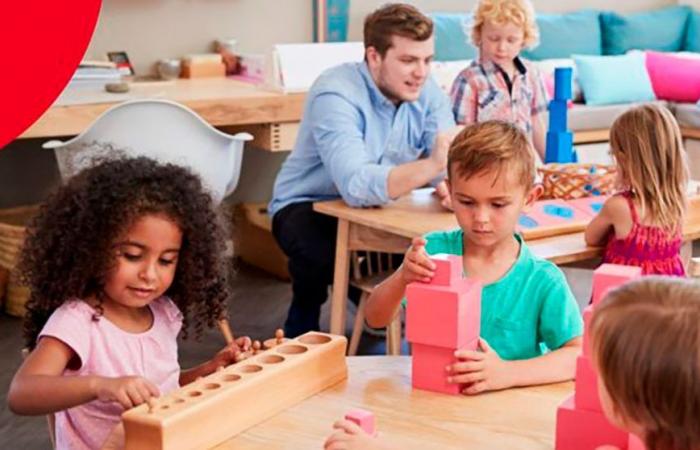Montessori pedagogy has been very successful in recent decades. This pedagogy has a very positive image in the media and has enthusiastic testimonies from former students and educators. Promoters of this pedagogy often rely on research results. For example, (Lillard, 2017) discusses eight of Dr. Montessori’s key insights into how people optimally learn and develop and how her insights are well supported by modern psychological research.
The article titled “An Association Between Montessori Education in Childhood and Adult Wellbeing” was published in Frontiers in Psychology in 2021 by Angeline S. Lillard, M. Joseph Meyer, Dermina Vasc, and Eren Fukuda (Lillard, AS, , Meyer, MJ, Vasc, D, & Fukuda, 2024).
The study investigates the relationship between Montessori education during childhood and well-being in adulthood. A large set of well-being scales completed by 1905 adults were analyzed, examining the influence of having attended Montessori schools versus conventional schools.
Among the strengths of the Article, it was found that it uses a structural equation model to analyze the relationship between Montessori education and various well-being factors, controlling variables such as age, gender, race, and socioeconomic status, it is important to highlight what Marshall proposes. when he says: A central element of the Montessori educational method is the dynamic triad of child, teacher and environment. One of the functions of the teacher is to guide the child through what Montessori called the “prepared environment, that is, a classroom and way of learning designed to support the intellectual, physical, emotional and social development of the child through active exploration, choice and independence” (Marshall, 2024).
This approach allows for a more nuanced understanding of the impacts of Montessori education. Another striking element is the size of the sample since 1905 people are taken and this has very considerable dimensions, which strengthens the external validity of the study. Additionally, the diversity in duration of attendance at Montessori schools (ages 2 to 16) provides detailed insight into how different levels of exposure affect well-being. The results of the study that found that attending a Montessori school for at least two years is associated with higher levels of general well-being, commitment, social confidence and self-confidence in adulthood are striking.
These findings are consistent even when controlling for the type of private school attended.
Although the study is robust, there are limitations, such as the lack of active control groups and possible unmeasured selection bias. Future studies could benefit from more rigorous experimental designs, such as random assignment.
Research could be improved by using a broader range of assessment tools to measure well-being and other psychological variables. This would help to validate and complement the results obtained with the current scales.
The lack of control over the fidelity in the implementation of both Montessori and conventional pedagogy is an area that needs attention, in addition it is considered important to ensure that educational practices are implemented in accordance with its theoretical principles since it is crucial to evaluate its impact precisely.
This article supports the Montessori philosophy by highlighting how its educational principles can have long-term positive effects on well-being, autonomy in learning, the use of concrete materials and peer collaboration that are core components of Montessori education that, according to the study, contribute to greater well-being in adult life. These findings support the importance of prepared learning environments that foster self-determination and social stability, fundamental aspects of the Montessori philosophy.
The environment is organized to allow children to act freely and independently of adults (within a precise framework), thus promoting their autonomy, their initiative and allowing them to achieve deep concentration. The use of equipment includes movement, but is also intended to help students channel their need for movement. Then, since the material used by children is self-corrective, they have immediate feedback on their success, without intervention from adults, (Lillard, AS, , Meyer, MJ, Vasc, D, & Fukuda, 2024).
The study results suggest that faithful implementation of Montessori education not only benefits students throughout their childhood, but also has a lasting positive impact. This reinforces the need to invest in the training of Montessori teachers and in the creation of learning environments that follow these principles, providing an empirical basis to argue for the expansion of this pedagogical model in different educational contexts.
References:
- Gentaz, E. &. (2024, May 05). Psychological Development and School Learning. Children. Retrieved from The Behavioral Effects of Montessori Pedagogy on Children’s: https://doi.org/10.3390/children9020133
- Lillard, A.S. (2017). Montessori. The Science behind the genius. NY: OXFORD UNIVERSITY PRESS.
- Lillard, AS, , Meyer, MJ, Vasc, D, & Fukuda. (2024, May 5). Frontiers in Psychology. Retrieved from An Association Between Montessori Education in Childhood and Adult Wellbeing.: https://www.frontiersin.org/articles/10.3389/fpsyg.2021.721943/full
- Marshall, C. (2024, May 05). Science of Learning. Retrieved from Montessori Education and Its Impact on Children’s: https://www.nature.com/articles/s41539-017-0012-7.pdf






